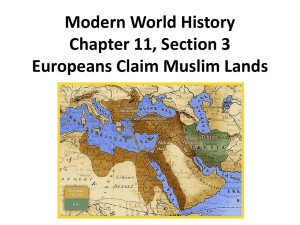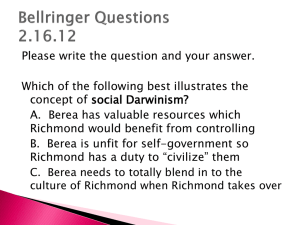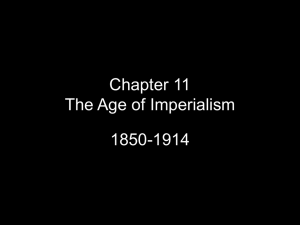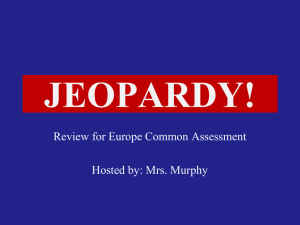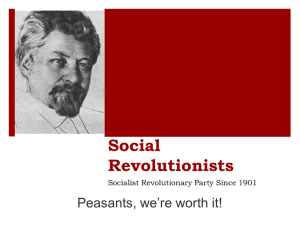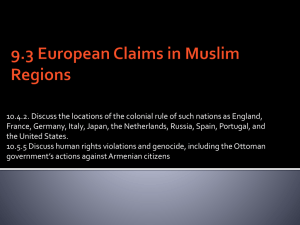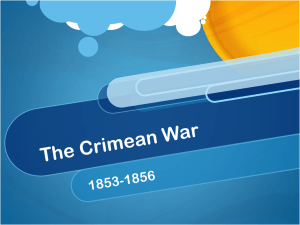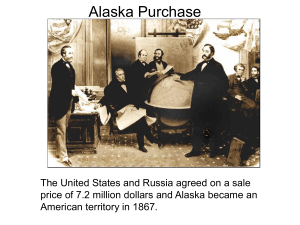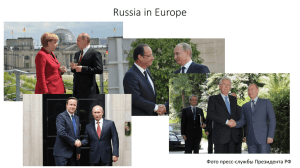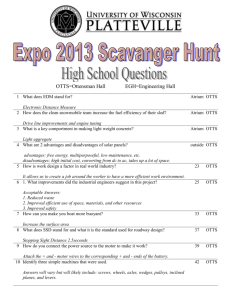File
advertisement
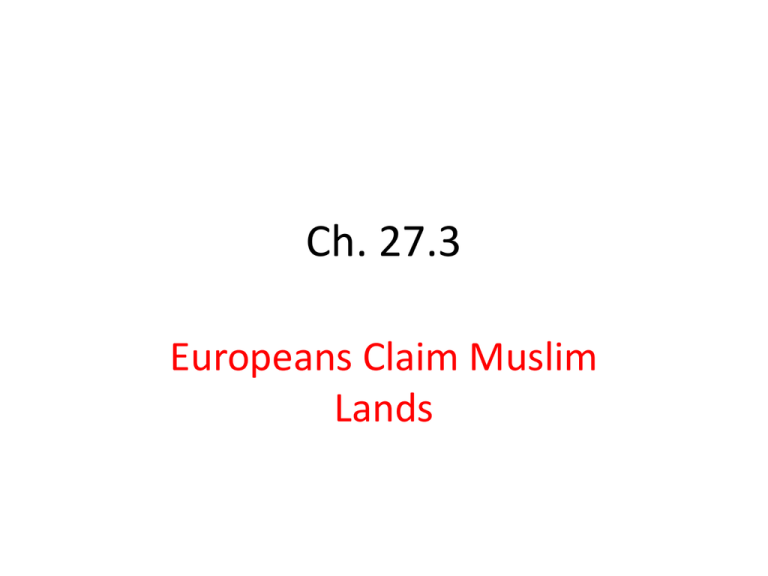
Ch. 27.3 Europeans Claim Muslim Lands Discussion Questions • Why did Europeans imperialize Africa? • Examine the map below. What was so strategic about the extensiveness of the Ottoman Empire? • Why was the land of the Ottomans so desirable to Europeans? RESPONSES • Natural Resources, labor, Christianity • Waterways in and out of Mediterranean Sea – Access to Red Sea, Persian Gulf – Control of land surrounding Mediterranean Sea – 6 access points to Med. and Arabian Seas • Trade routes, especially for areas with no access to Mediterranean – Oil deposits in Persia Ottomans Lose Power • Arab and Ottoman conquests create vast empire surrounding Mediterranean (Med.) Sea • Weak successors to Suleyman I lead to failures – Corruption and theft lead to debt – Inflation • Modernization attempts by Selim III fails – Janissaries (elite Ottoman soldiers) resist – Selim overthrown • Nationalism by people of Ottoman empire rises – Greece and Serbia gain self-rule Geopolitics and European Land Grab • Geopolitics defined: An interest in or taking of land for strategic locations or products • Current example: 80 percent of European gas imports travels from Russia through Ukraine • What happens when Russia and Ukraine spat? Geopolitics and Imperialism • Location, location, location – Creates interest for Ottoman land • Ottomans controlled access to Med. and Atlantic Sea trade • Merchants in landlocked countries forced to travel through Ott. Emp. • Russia wants access through Black Sea and into Med. – Grain exports • Discovery of Oil in Persia and Arabian Peninsula Russia and Crimean War • Purpose: give Russia a warmweather port and access to Black Sea and Med. Sea • Britain and France enter war – Prevent Russia from gaining more Ott. land – Fight with Otts and defeat Russia • First war women established positions as army nurses and covered by newspapers • Florence Nightingale Crimean cont… • War reveals Ott’s weakness • Russia helps Slavics in Balkans • Otts lose: – – – – – – – Romania Montenegro Cyprus Bosnia Herzegovina Bulgaria Land in northern Africa “Great Game” • Britain vs. Russia • Geo-Pol. Struggle over Muslim land in Central Asia – Especially India and Afghanistan • England attempts to spread empire into Afghanistan – (b/t Russian (Persia) and British (India) empires) Afghanistan’s Importance • 1800s: Independent Muslim kingdom • Physical geography and resistance discouraged colonization • Britain gets out 1881 – 1921 formally agrees to not extend border – Soviet Union (Russia) sign non-aggression pact • Soviets change policy in 1979 invasion of Afg. Egyptian Reforms • Initiates political and social reforms to block Euro imperialism • Military and economic reforms result from French occupation – Egypt’s location (head of Read Sea entering Med.) • Muhammad Ali – Sent by Otts to govern Egypt – Gains Syria and Arabia – Europe recognizes M.A. as ruler of Egypt • Ali reforms: – Shifted Egyptian agriculture to plantation cash crop (cotton) – Effect: Traditional farmers (peasants) lose land used for food Suez Canal • Isma’il (Ali’s grandson) continues modernization • Constructs Suez Canal – 101 mile ship Canal in Egypt between Port Said on the Mediterranean and Suez on the Red Sea. – Vital shortcut b/t both Euro, East Coast American, southern Asia and eastern Africa ports – Opens 1869. • French contracts with Egypt • 10 years to construct • Ismail’s heavy spending and money spent on canal creates debt • Ismail forced to take out loans from European banks • Sells canal to Great Britain. • British send soldiers into Egypt – Concerned for their property – British occupy Egypt and control the Suez Canal. Persia’s Pressured • Russia vs. Britain – Sphere of Influence • Russian interests – Persian Gulf and Indian Ocean • British want buffer b/t India and Afghanistan (Russia) – Persia gives up claims to Afg. – Oil discovery increases Brit interest • Persia lacks capital to exploit resources – Sells rights to operate in certain areas or for certain products – England develops oil fields (1900s) Tobacco • 1890 Persian ruler Nasir al-Din grants concession to British company to export tobacco – By religious leaders fearing modernization • Outrages Persian leader who supports modernization – Boycott (heavy smokers) – Believes concession is a “sell-out” – Nasir cancels concession and is killed • Russia and Britain divide country into spheres of influence – Economic control established – Economic and Sphere of Influence forms used
